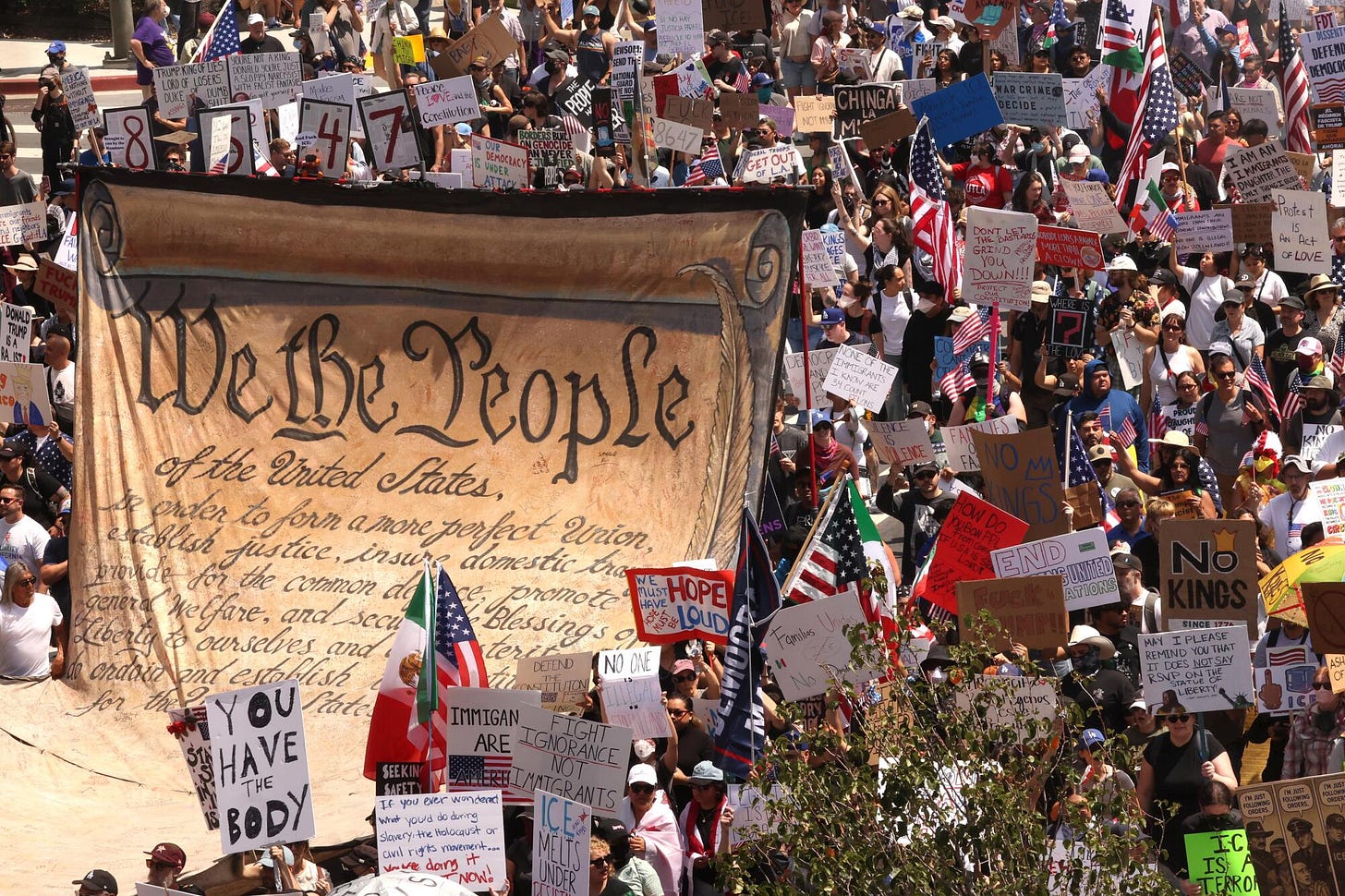What will this past weekend’s estimated five million people in the streets for a national day of protest against “kings” in America actually achieve? If recent history is any guide—specifically, the Women’s March of 2017—the answer may be ‘not much’. That protest, though also massive and spirited, was built on the same myth: that America is fundamentally sound, simply under temporary threat. It cast Donald Trump as an outlier, not as the product of a deeper unraveling. Both protests called for a return to decency, to restore the nation’s moral soul—but stopped short of interrogating the systems that eroded that trust in the first place.
The crisis these protests gesture toward is much older—and much deeper than many involved are willing to admit. Over the past several decades, America has quietly shifted from democracy toward oligarchy. The neoliberal era, sold as a triumph of free markets and personal freedom, consolidated power in the hands of corporations, billionaires, and an increasingly unaccountable political class. Public goods were dismantled. Working-class jobs disappeared. In their place came debt, insecurity, and uncertainty. Tens of millions of Americans watched their lives become harder, more precarious, and more unequal, while their politics turned inward toward symbolism, broken promises, and empty rhetoric.

American Decay
America has long claimed to reject kings. But in practice, the pageantry of protest without structural demands—the hallmark of liberal “resistance” to Trump—has become its own kind of royalist ritual. These protests act out dissent while preserving the status quo, much like monarchies once used public ritual to sanctify rule. They offer moral clarity without confrontation. They reassure people that democracy still functions, even as its foundations collapse. The result isn’t rebellion. It’s performance, an expression of frustration that leaves the true centers of power untouched.
Because Trump isn’t the only king in America. Power wears many faces: billionaires who shape policy, CEOs who treat workers as disposable, lobbyists and corporate boards that help write the rules they profit from. These are our modern monarchs, not outside the state, but governing alongside it. And yet most protests aimed at “saving democracy” leave this power structure intact.
We saw this dynamic clearly in Los Angeles last week. Senator Alex Padilla was removed from a press conference held by Trump’s immigration enforcement agency. Instead of returning to the frontlines, or using his office to challenge state cooperation with ICE, he went on a media blitz, culminating in an in-studio segment on Pod Save America. What could have been a moment to escalate pressure became a moment to manage optics. The gesture was repackaged as resistance, but functioned more like narrative maintenance.
Around the same time, Governor Gavin Newsom posted a TikTok using a Mean Girls sound to announce a lawsuit against Trump’s National Guard deployment. It did nothing in the moment to protect the people being tear-gassed in the streets or ripped away from family members.
These weren’t acts of resistance. They were performances, rituals meant to show someone was speaking out, while the deeper structure, shared between state and capital, remained intact.
Power and Illusion
Trump didn’t win because he governed well. He won by naming what was broken. That alone was enough. His populism is largely rhetorical, but in a country where neither party has addressed collapsing living standards or collective purpose, rhetoric can feel like salvation.
When Trump blames immigrants or deploys the National Guard to deep blue cities, many don’t see tyranny, they see action. He names a villain, breaks the rules, and dares anyone to stop him. In a system defined by scarcity, where wages stagnate, rents rise, and public goods vanish, decisive cruelty often reads as strength. People don’t need policies to succeed. They need to believe someone is finally on their side.
That is the appeal of strongman rule in moments of collapse: not because people long for domination, but because they’ve been taught that real power is always elsewhere, untouchable, reserved for those with titles or wealth. In the absence of democratic agency, force looks like freedom.
Liberalism once promised a different kind of power and freedom altogether. It claimed to protect the vulnerable and expand rights. At its core was freedom, not just from government interference, but the freedom to live with dignity, to participate in public life, and to shape a future. But under neoliberalism, that vision narrowed. Freedom became the right to compete, consume, and survive alone.
This version isolates more than it empowers. It tells people to fend for themselves, avoid dependence, and treat hardship as personal failure. The result is a society where autonomy is sacred but real agency—collective, material, democratic, is increasingly out of reach. Today’s liberal resistance protests echo the language of freedom but rarely reclaim its substance.
This is no accident. The system absorbs symbolic protest. It rewards resistance that is aesthetic, emotional, and indirect. As long as protest stays in the realm of moral performance, it is treated as proof that the system still works—a kind of pressure-release valve that reassures an elite class more afraid of disruption than of injustice. That’s why, when protest begins to name real interests—public ownership, redistribution, labor power—it is no longer celebrated, but pathologized. The same liberal media outlets that applaud resistance marches for their spirit and civility often dismiss protests with concrete demands as fringe, dangerous, or naïvely utopian. What they fear isn’t chaos but clarity.
A New Kind of Monarchy
Neoliberalism is not just a set of policies. It’s a deeply ingrained ideological worldview. It teaches us to see freedom as isolation, politics as branding, and solidarity as naïve. On the left, it still shapes the limits of our political imagination. It tells us power lives somewhere else, and that our role is to react, not reclaim what’s been lost at a deeper, structural level.
In that sense, neoliberalism doesn’t just coexist with monarchy, it mirrors it. Power is concentrated, untouchable, and treated as natural. Its rulers don’t wear crowns. They govern through contracts, platforms, markets, and state alignment.
Protests with real demands—housing, wages, public control, the end of surveillance, would threaten far more than Trump. It would confront the system that both enabled his rise and that sustains him: the modern monarchy of corporate executives, financiers, tech platforms, and private equity, all governing without consent.
Because the opposite of monarchy isn’t ritual. It’s power. Shared, accountable, and built from below. To say “no kings” must mean more than rejecting a man. It must mean rejecting the idea that power belongs to anyone but us.




The trouble with this post is it seems to equate liberalism and the left with the Democrat party, and liberalism with neoliberalism, which isn't the same thing at all--neoliberalism is the essence of conservatism.
As to the utility of five million people participating in No Kings rallies (while Trump's obscene birthday military parade turned out to be a sad, pathetic affair)--one would have to be naive to think the rallies were intended to right the wrongs and depose Trump. (While saying Trump is the culmination of the trajectory we've been on for a long time and not the sole problem is quite accurate.) The utility of big rallies, of the Occupy gatherings lies in what they prepare for. Those who attend get their morale boosted, see that they're far from alone, learn from each other, and network. This piece seems to imagine a protest that attempts to actually wrench power from those who have it, and impose a change of rules. That would be a violent revolution, and those rarely end well.
What has a chance of actually reforming this system is a general strike, in which people refuse to work OR buy anything for extended periods, which issues a clear set of demands (she's right about that). For this to be effective it needs mass participation, which takes time to organize. The rallies could be a key means of doing this, handing out flyers naming the dates and the demands--after representatives from hundreds of environmental, BIPOC, labor and other groups convene to hash out the details, notably the demands. The enemy plans to replace most of us as workers with AI anyway, so the refusal to buy is more important than withholding labor; to be able to participate fully, people need to prepare by stockpiling necessities in advance, but critically must also make changes such that they will be able to cease buying many things permanently. This change toward relocalizing economies and self-sufficiency--better, collective self-sufficiency in a community-- is necessary regardless of governance, because we are hurtling toward civilizational breakdown and possibly extinction due to overshoot, too many humans consuming too much. Almost nothing is being done about the climate crisis; meanwhile the equally urgent crisis of biodiversity loss is rarely even named. Then there's the proliferation of plastic, PFAS, and other longlived chemicals life is not equipped to process. These environmental issues are the most important because they will still be reverberating thousands of years from now when Trump is long forgotten--and because they may very well cause human extinction so questions of governance are moot. Along with the risk of nuclear war, which is a real and rising risk, and could cause the extinction of most advanced life on Earth.
Excellent article-thank you 👏